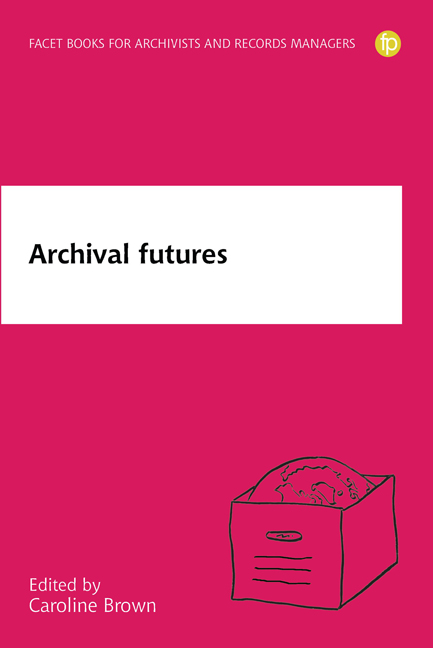Book contents
- Frontmatter
- Dedication
- Contents
- Notes on contributors
- Introduction
- 1 It's the end of the archival profession as we know it, and I feel fine
- 2 Whose truth? Records and archives as evidence in the era of post-truth and disinformation
- 3 The future of archives as networked, decentralised, autonomous and global
- 4 Can we keep everything? The future of appraisal in a world of digital profusion
- 5 Frames and the future of archival processing
- 6 Access technologies for the disruptive digital archive
- 7 Multiple rights in records: the role of recordkeeping informatics
- 8 The accidental archive
- 9 The end of archival ideas?
- Index
4 - Can we keep everything? The future of appraisal in a world of digital profusion
Published online by Cambridge University Press: 01 June 2019
- Frontmatter
- Dedication
- Contents
- Notes on contributors
- Introduction
- 1 It's the end of the archival profession as we know it, and I feel fine
- 2 Whose truth? Records and archives as evidence in the era of post-truth and disinformation
- 3 The future of archives as networked, decentralised, autonomous and global
- 4 Can we keep everything? The future of appraisal in a world of digital profusion
- 5 Frames and the future of archival processing
- 6 Access technologies for the disruptive digital archive
- 7 Multiple rights in records: the role of recordkeeping informatics
- 8 The accidental archive
- 9 The end of archival ideas?
- Index
Summary
Introduction
This chapter asks whether we might begin to develop a vision of digital archives where nothing is ever destroyed. Today, proponents of ‘big data’ often argue that appraisal and selection are obsolescent. Can we – should we – try to keep everything, as many computing specialists now suggest? What place will selection and destruction practices have in a future digital world where storing everything may seem easier than incurring the costs and complexities of appraisal?
Selective retention
Decisions about destruction have been made since the earliest days of record-making. It has sometimes been thought that records in earlier times were intended to be permanent, and that keepers of records played no part in their destruction, until the practice of retaining everything had to be abandoned in the face of the growing physical bulk of records in the 20th century. Systematic destruction practices, however, have a much longer history. In the palaces and cities of the ancient world, accounting records were often routinely destroyed within a year of their creation (Eidem, 2011, 13; Palaima, 2003). In 1731, instructions were issued to the Royal Archives of Sardinia that ‘useless papers’ should be destroyed (Duchein, 1992, 17); three decades later, French archivist Pierre-Camille Le Moine similarly insisted on the destruction of seemingly trivial items (Delsalle, 1998, 154). In the UK, the Public Record Office Act of 1877 authorised the disposal of records thought insufficiently valuable (Cantwell, 1991, 277–80). The 20thcentury appraisal methodologies articulated by Theodore Schellenberg (1956) formalised and encouraged these practices, but the origins of selectivity are much older.
Before digital technology became widely available, archival writers routinely put forward two arguments in favour of selective destruction: the need to save costly storage space and the difficulty of finding and using ‘important’ material if archives are congested with supposedly useless ephemera. These arguments appear in very similar form in the work of Charles Johnson in the early 20th century and in the writings of Gerald Ham in the century's final decade (Ham, 1993, 3; Johnson, 1919, 43–4). Although Hilary Jenkinson (1922) refused to allow the archivist any part in selection, many later writers saw a specific role for archivists in ‘fashioning … a manageable historical record’ (Ham, 1993, 3).
- Type
- Chapter
- Information
- Archival Futures , pp. 45 - 64Publisher: FacetPrint publication year: 2018
- 5
- Cited by



